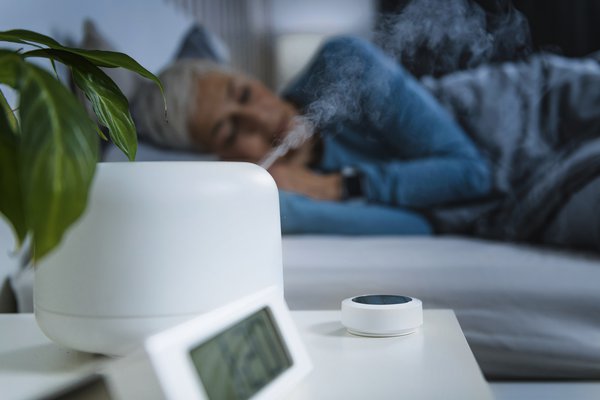Running a humidifier in your home or office can help alleviate common irritations many people deal with, from congestion to cracked lips to dry skin.
Humidifiers add moisture to the air around us, counteracting the effects of evaporation in dry environments where skin tends to chap, sinuses become clogged, and viral particles are able to circulate and cause infections more easily.
- MORE ON HEALTH & WELLNESS
- The differences between X-rays, CT scans, and MRIs
- Tips for getting a good night’s sleep during the winter months
- Common health problems facing millennials
While many people use humidifiers in the summer to help prevent seasonal allergy flare-ups — air conditioners are a common culprit for reducing moisture indoors — the greatest value for these devices comes during the cold winter months when the air is naturally drier from day to day and we're more likely to be inside for longer periods of time.
Here are four great reasons to use a humidifier in the winter.
1. Humidifiers reduce cold weather discomforts
People who are prone to dry skin and hair, dry eyes, bloody noses, chapped lips, and sinus headaches can all benefit from keeping a humidifier around in areas where they sleep, work, or lounge.
By adding moisture to the air, a humidifier can help prevent these issues from cropping up by keeping your body's airways open and breaking up mucus.
2. A humidifier can fend off viral infections
Research has shown that using a humidifier in the winter reduces the risk of respiratory infections by deactivating viral particles. One study found that when influenza was added to the air with a simulated cough, the ability of an infection to spread was reduced significantly by the presence of a humidifier used with the proper settings.
Since respiratory infections like the flu and COVID-19 are most common in the winter, a humidifier can help protect people who are in enclosed spaces where they are most likely to become sick.
3. Humidifiers may help reduce snoring
When airways are dry and dehydrated, they tend to have thicker mucus that increases surface tension and leads to snoring.
A well-placed humidifier can help reduce nasal congestion and throat irritation caused by breathing dry air. The additional moisture in the room calms the airways and ensures that those who are disrupted by snoring are able to sleep more soundly without waking up.
4. Humidifiers make coughs more productive
If you have a persistent dry cough and congestion that won't go away during the winter, a humidifier can help clear the airways and relieve frustrating symptoms. As more moisture gets into the airways, it becomes easier to release trapped phlegm.
This is especially important at night, since mucus tends to collect in the back of throat and chest when we lie down. When cough symptoms worsen at night, it's harder to sleep, and the problems carry into the next day. A humidifier may help you get over an infection more quickly.
Types and maintenance
There are many different types of humidifiers that are optimal for different settings. Portable humidifiers such as evaporators, steam vaporizers, and ultrasonic devices are most common. They can be placed in one room at a time and easily moved around depending on your needs.
It's a good idea to research various products in order to determine which will be best for you. It’s also important to be aware of the recommended settings for different outdoor temperatures, follow proper maintenance guidelines for your humidifier, and know what you should do to prevent mold growth caused by too much moisture getting inside.
Typically, the best relative humidity to set for a room indoors is between 40-60%, which is the range that stifles bacteria and viruses.
If you find that dry conditions in the winter lead to health issues in your home, a humidifier may be a great tool to keep you feeling clear, symptom free, and well rested.



